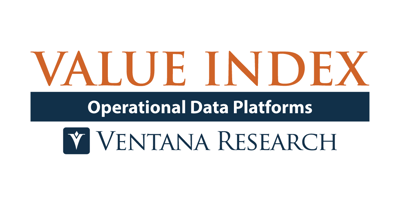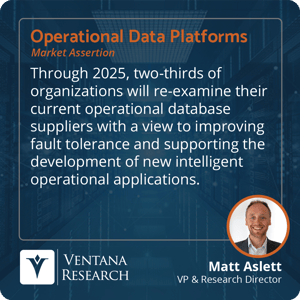Ventana Research recently published the 2023 Operational Data Platforms Value Index. The importance of the operational data platform has never been greater as organizations strive to be more data-driven, incorporating intelligence into operational applications via personalization and recommendations for workers, partners and customers. In this post, I’ll share some of my observations on how the operational data platforms market is evolving.
Our Value Index for Operational Data Platforms represents technology vendors and products designed to store, manage and process data to support worker-, customer- and  partner-facing operational applications across on-premises, hybrid and multi-cloud environments. Operational data platforms support applications used to run the business, including finance, operations and supply chain, sales, human capital management, customer experience and marketing. Operational data platforms include relational and non-relational databases (including NoSQL) as well as the increasing convergence of relational and non-relational approaches.
partner-facing operational applications across on-premises, hybrid and multi-cloud environments. Operational data platforms support applications used to run the business, including finance, operations and supply chain, sales, human capital management, customer experience and marketing. Operational data platforms include relational and non-relational databases (including NoSQL) as well as the increasing convergence of relational and non-relational approaches.
The operational data platforms market has been dominated by the relational data model and relational database management systems since the 1980s. However, non-relational data models that predate relational, such as the hierarchical model, remain in use today. Recent decades have also seen the proliferation of non-relational data platforms as the use of NoSQL databases using key-value, document and graph models has increased.
Our research shows that almost three-quarters (72%) of participants in Ventana Research’s Analytics and Data Benchmark Research are using relational databases today, while almost one-quarter (22%) are using NoSQL databases..png?width=300&height=300&name=Ventana_Research_Benchmark_Research_Analytics_Relational_Databases%20(2).png) It is important to note that almost all organizations will ultimately need to use a combination of data platforms.
It is important to note that almost all organizations will ultimately need to use a combination of data platforms.
The initial adoption of non-relational database offerings is typically driven by the need to serve very specific requirements associated with an individual data model (for example, graph or key-value store). As such, the various data models continue to be important considerations for non-relational database use cases. However, while a few specialist databases remain, a period of evolution and functional consolidation has resulted in most products supporting multimodel capabilities.
The fact that many non-relational databases are now able to support a combination of data models has blurred the lines between what have traditionally been considered appropriate use cases. Additionally, non-relational database vendors have also added capabilities and features that have previously been the preserve of the incumbent relational databases, including relational database concepts and even SQL query language. One approach does not suit all use cases, and organizations use a variety of operational data platforms to fulfill the spectrum of requirements for a myriad of applications.
Furthermore, we have seen adoption driven by requirements that transcend the data model. Developer agility is one such driver, for which adoption is accelerated by the availability of serverless databases. Horizonal scalability is  another factor that is increasingly important, given the growing requirement for cloud-agnostic data platforms that support availability and scalability across multiple regions, data centers and cloud providers. I assert that through 2025, two-thirds of organizations will reexamine current operational database suppliers with a view to improving fault tolerance and supporting the development of new, intelligent operational applications. From a Capability perspective, this was reflected in the Value Index assessment of operational data platforms by a greater emphasis on support for:
another factor that is increasingly important, given the growing requirement for cloud-agnostic data platforms that support availability and scalability across multiple regions, data centers and cloud providers. I assert that through 2025, two-thirds of organizations will reexamine current operational database suppliers with a view to improving fault tolerance and supporting the development of new, intelligent operational applications. From a Capability perspective, this was reflected in the Value Index assessment of operational data platforms by a greater emphasis on support for:
- Sharding and shard avoidance.
- Distributed consensus.
- Clock synchronization.
- Operational application partnerships.
- Hybrid operational and analytic processing.
The latter is increasingly important given the recent growth in the development of intelligent applications infused with the results of analytic processes, such as personalization and artificial intelligence-driven recommendations. At Ventana Research, we continue to believe that, for most use cases, there is a clear, functional requirement for either analytic or operational data platforms. The Operational Data Platforms Value Index reflects this by assessing vendors and products positioned as operational data platforms on the ability to serve the specific requirements of operational use cases. However, the emergence of intelligent applications impacts requirements for operational data platforms to support real-time analytic functionality, albeit without eradicating the need for complementary analysis of data in a separate analytic data platform.
While there have always been general-purpose databases that could be used for both analytic and operational workloads, if both workloads run concurrently on the same database, the challenge is to ensure that analytic processing does not impact the performance of operational processing. It is for this reason that traditional architectures have involved the extraction, transformation and loading of data from an operational data platform into an external analytic data platform, enabling operational and analytic workloads to run concurrently without adversely impacting each other.
The need for real-time interactivity means that these applications cannot be served by traditional processes that rely on batch extraction, transformation and loading of data from operational data platforms into analytic data platforms for analysis. Instead, they rely on analysis of data in the operational data platform itself via hybrid data-processing or real-time analytics capabilities to accelerate decision-making or improve customer experience. Organizations need to closely monitor the evolution of products designed to support real-time operational applications, as a complement to continued investment in specialist analytic data platforms.
The results of our analysis are reported in our 2023 Operational Data Platforms Value Index. We encourage you to review the results and consider how each of these vendors can support the needs of your organization.
Regards,
Matt Aslett

 partner-facing operational applications across on-premises, hybrid and multi-cloud environments.
partner-facing operational applications across on-premises, hybrid and multi-cloud environments. .png?width=300&height=300&name=Ventana_Research_Benchmark_Research_Analytics_Relational_Databases%20(2).png) It is important to note that almost all organizations will ultimately need to use a combination of data platforms.
It is important to note that almost all organizations will ultimately need to use a combination of data platforms. another factor that is increasingly important, given the growing requirement for
another factor that is increasingly important, given the growing requirement for 








